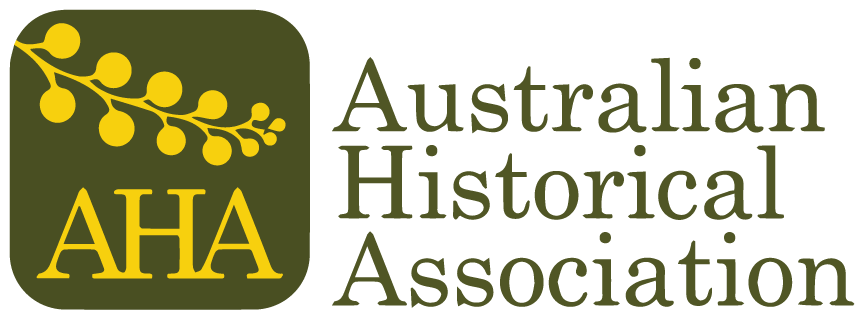2022 Kay Daniels Award
Bill Bell, Crusoe’s Books: Readers in the Empire of Print 1800-1918 (Oxford University Press, 2021)
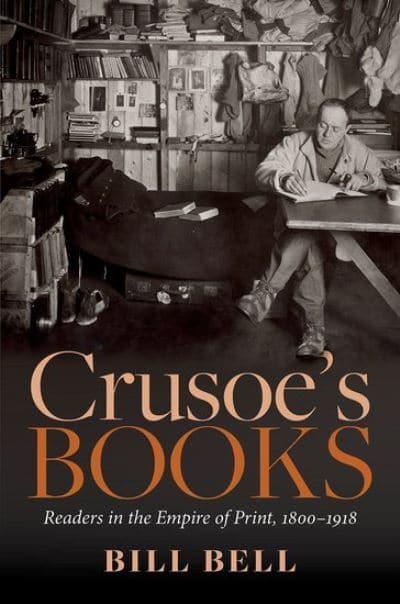 In Crusoe’s Books, Bill Bell presents a unique and refreshing take on convict history combining exceptional scholarship with a gift for language and narrative style. Using the lens of literacy and observing its impact on the development of culture for those incarcerated or displaced, Bell presents the convict not only as the recipient of text, but as a reading subject. Bell traces the multifarious and embodied relationships of convicts to the printed word, placing this story firmly within an international context during a period of significant change in imperial history. The research is of high scholarly calibre and the writing is accessible and skilful. This is a beautifully crafted book.
In Crusoe’s Books, Bill Bell presents a unique and refreshing take on convict history combining exceptional scholarship with a gift for language and narrative style. Using the lens of literacy and observing its impact on the development of culture for those incarcerated or displaced, Bell presents the convict not only as the recipient of text, but as a reading subject. Bell traces the multifarious and embodied relationships of convicts to the printed word, placing this story firmly within an international context during a period of significant change in imperial history. The research is of high scholarly calibre and the writing is accessible and skilful. This is a beautifully crafted book.
Commendations:
Janet McCalman, Vandemonians (Melbourne University Press, 2020)
Vandemonians offers an important and eloquent accompaniment to the vast and valuable data gathered in the significant ‘Founders and Survivors Ships Project Data’. The book uses both prosopography and a ‘cradle to grave’ approach to illuminate the untold history of the thousands of Vandemonians who went to early Port Phillip. The life course writing not only gives voice and vibrancy to ‘forgotten women’, it showcases ways to interpret and navigate digital history data. The empathy McCalman shows in revealing convict women’s experiences makes this book of vital historiographical and empirical importance to scholars in the field.
Katherine Roscoe, ‘Work on Wadjemup: Entanglements between Aboriginal Prison Labour and the Imperial Convict System in Western Australia’, Studies in Western Australian History, 34, 2020; and ‘Islands of Incarceration and Empire Building in Colonial Australia’, in Douglas Hamilton and John McAleer (eds) Islands and the British Empire in the Age of Sail (Oxford University Press, 2021).
Katherine Roscoe’s articles do a superb job of adding to the corpus of knowledge of convict historiography. The first offers important new knowledge about Western Australian Aboriginal prison labour, exploring the entanglements between the largely ‘invisible’ Aboriginal workforces of Nyoongar men in colonial Western Australia with incarcerated convicts. The latter article brings new insights to the use of islands as places of incarceration, and traces the developing scientific epistemologies sparked by a new and unique environment. Both are excellent works of scholarly writing; clear, concise, well edited, and placing the Australian convict story firmly in the global context.
Judges: Penny Edmonds (Flinders), Rebe Taylor (UTas), Caitlin Vertigan (PAHSMA)
2020 Kay Daniels Award
Hilary M. Carey, Empire of Hell. Religion and the Campaign to End Convict Transportation in the British Empire, 1788-1875. Cambridge: Cambridge University Press, 2019
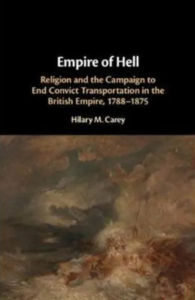
Hilary Carey’s Empire of Hell is an impressive work of scholarship that offers valuable new insights into the complex relationships between the Christian clergy, missionaries and advocates and convict transportation and prison reform. Based on extensive research in the United Kingdom and Australia, the book brings to light the debates between churchmen of all denominations, politicians and colonial administrators through an investigation of the Australian penal colonies (New South Wales, Van Diemen’s Land, Norfolk Island, Western Australia and Port Phillip’s exiles), Bermuda and Gibraltar. Carey has made two particularly significant interventions into convict historiography. She has reintroduced religion into what has become an increasingly secular body of work, and has also reminded us how the discourse of reformation that underpinned the convict system was highly significant, yet has often been overlooked in recent works that tend to focus more on punishment. By paying careful attention to the communications flowing not only between the colonial and convict authorities in the Australian colonies but also to the correspondence between leading religious figures, she provides nuanced accounts of the ideologies underpinning these men’s discourses and actions. Her research highlights how convict transportation varied according to time and place. There was not simply a ‘one size fits all’ approach adopted across the British empire. She provides useful insights into the ideological and practical reasons for such variances. Though the course and cessation of convict transportation have been previously well-examined, Carey’s use of religion to tell this story is refreshingly novel and will stimulate a reconsideration of the convict experience and the involvement of clergy in the colonies.
Judges: Carol Liston, (Western Sydney, Chair and AHA rep), Kristyn Harman (UTas), Richard Tuffin, (UNE, PAHSMA rep).
2018 Kay Daniels Award
Joan Kavanagh and Dianne Snowden, Van Diemen’s Women: A History of Transportation to Tasmania(The History Press Ltd)
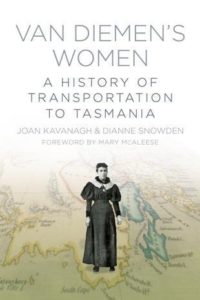 This is a very impressive work in which the authors have mastered a prodigious quantity of primary sources. It follows the lives of the 138 Irish women (and their 35 children) transported to Van Diemen’s Land on the convict transportTasmania (2)in 1845, the year that the potato blight first struck Ireland. The study sets out to examine the women, the conditions in which they lived in Ireland, the reasons for their sentencing and the social impact of their transportation. In this it succeeds admirably. Moreover, the exploration of the women’s descendants emphasises the role convictism played in the formation of contemporary Australia, as well as the global familial connections forged through the results of forced migration and transportation. This book is weighty contribution to our knowledge of female convicts and as such is a worthy recipient of the Kay Daniels Award. It will be valuable in a scholarly sense, by adding to our knowledge and by providing research insights. It may also offer insights to family historians working on convict lives by providing new research directions.
This is a very impressive work in which the authors have mastered a prodigious quantity of primary sources. It follows the lives of the 138 Irish women (and their 35 children) transported to Van Diemen’s Land on the convict transportTasmania (2)in 1845, the year that the potato blight first struck Ireland. The study sets out to examine the women, the conditions in which they lived in Ireland, the reasons for their sentencing and the social impact of their transportation. In this it succeeds admirably. Moreover, the exploration of the women’s descendants emphasises the role convictism played in the formation of contemporary Australia, as well as the global familial connections forged through the results of forced migration and transportation. This book is weighty contribution to our knowledge of female convicts and as such is a worthy recipient of the Kay Daniels Award. It will be valuable in a scholarly sense, by adding to our knowledge and by providing research insights. It may also offer insights to family historians working on convict lives by providing new research directions.
Judges: Jenny Gregory, Stefan Petrowand Jody Steele
2016 Kay Daniels Award
Sue Castrique, Under the Colony’s Eye: Gentlemen and Convicts on Cockatoo Island 1839–1869 (Anchor Books Australia, 2014)
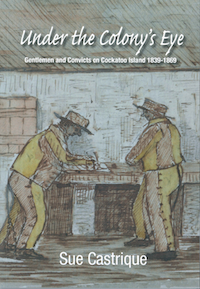 The history of Cockatoo Island as a penal station situated in the very heart of Sydney and yet remote from its everyday life is a uniquely interesting but hitherto overlooked part of the convict saga, reflecting an original and rewarding choice of subject. Cockatoo Island is one of the four sites in New South Wales granted World Heritage listing as part of the series of Australian convict places. Opened at the very end of convict transportation to New South Wales in 1839, its penal history has largely been ignored, overshadowed by interest in the dry dock built on the island. Castrique’s book is thus a particularly important contribution to the convict story of NSW.
The history of Cockatoo Island as a penal station situated in the very heart of Sydney and yet remote from its everyday life is a uniquely interesting but hitherto overlooked part of the convict saga, reflecting an original and rewarding choice of subject. Cockatoo Island is one of the four sites in New South Wales granted World Heritage listing as part of the series of Australian convict places. Opened at the very end of convict transportation to New South Wales in 1839, its penal history has largely been ignored, overshadowed by interest in the dry dock built on the island. Castrique’s book is thus a particularly important contribution to the convict story of NSW.
A strong archival base has been used skilfully to weave a gripping tale of colonial politics that over-arches the convict experience but has its own gripping drama to tantalise, dismay and always fully engage the reader. Patronage, corruption, intrigue, injustice, maladministration weave their way through the narrative. The story of illicit prize fights works well as a consolidating theme, despite the intriguing mystery remaining over the encounters themselves. All is told in stylish but economical prose that reveals the hand of a gifted and confident story-teller with a good dramatic sense. The outcome is a modest but successful book.
Judges: Bob Reece, Carol Liston, Stefan Petrow
2014 Kay Daniels Award
Kristyn Harman, Aboriginal Convicts: Australian, Khoisan and Maori Exiles (UNSW Press, 2013)
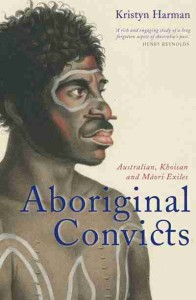 Aboriginal Convicts illuminates an overlooked but instructive aspect of Australia’s convict past by revealing the lives and fates of some of the Indigenous peoples who became enmeshed in the convict systems of New South Wales and Tasmania in the first half of the nineteenth century. Primarily concerned with Aboriginal Australians and the criminalizing of their resistance to European invasion, some attention is also given to Maori and South African Khoi transported to the Australian colonies, often for comparable acts of defiance. This book succeeds in tracing a multitude of diverse experiences and outcomes, ranging across different colonial settings, and is enriched by contextual detail that captures a world defined by the exigencies of frontier conflict, the dubious application of law, and the malevolence and hardships of convict servitude in some of the darkest corners of the system. Presented in an engaging and down-to-earth style, Aboriginal Convicts is accessible to a very broad readership, at the same time as it opens avenues for further scholarly research. On both counts, this work is a most valuable contribution to our contemporary understandings of and debates about early Australian history.
Aboriginal Convicts illuminates an overlooked but instructive aspect of Australia’s convict past by revealing the lives and fates of some of the Indigenous peoples who became enmeshed in the convict systems of New South Wales and Tasmania in the first half of the nineteenth century. Primarily concerned with Aboriginal Australians and the criminalizing of their resistance to European invasion, some attention is also given to Maori and South African Khoi transported to the Australian colonies, often for comparable acts of defiance. This book succeeds in tracing a multitude of diverse experiences and outcomes, ranging across different colonial settings, and is enriched by contextual detail that captures a world defined by the exigencies of frontier conflict, the dubious application of law, and the malevolence and hardships of convict servitude in some of the darkest corners of the system. Presented in an engaging and down-to-earth style, Aboriginal Convicts is accessible to a very broad readership, at the same time as it opens avenues for further scholarly research. On both counts, this work is a most valuable contribution to our contemporary understandings of and debates about early Australian history.
Judges: David Andrew Roberts, Chair, Tom Dunning, Jane Harrington
2012 Kay Daniels Award
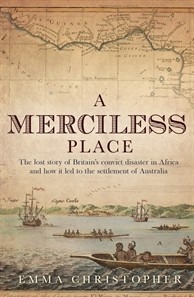 Emma Christopher, A Merciless Place: The Lost Story of Britain’s Convict Disaster in Africa and How it Led to the Settlement of Australia (Allen & Unwin)
Emma Christopher, A Merciless Place: The Lost Story of Britain’s Convict Disaster in Africa and How it Led to the Settlement of Australia (Allen & Unwin)
Commendation: Anna Johnston, The Paper War: Morality, Print Culture and Power in Colonial New South Wales (UWA Publishing)
Judges: Joy Damousi, Ken McNab, Julia Clarke
.
2010 Kay Daniels Award
Hamish Maxwell-Stewart, Closing Hell’s Gates: The Death of a Convict Station (Allen & Unwin, 2008)
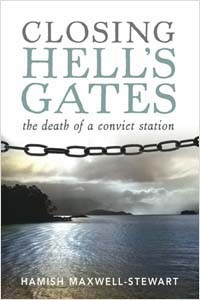 Drawing on a meticulous examination of contemporary records, Closing Hell’s Gates captures the rich and complex history of the Macquarie Harbour penal station which existed between 1822 and 1834. Eloquently written, this account is set within the broader canvas of a brutal, violent and devastating past, and successfully places new historical detail with the sweeping wider context of Tasmanian colonial history. This work is a major achievement in further extending our knowledge and understanding of Australia’s convict past and in providing innovative ways of writing about it.
Drawing on a meticulous examination of contemporary records, Closing Hell’s Gates captures the rich and complex history of the Macquarie Harbour penal station which existed between 1822 and 1834. Eloquently written, this account is set within the broader canvas of a brutal, violent and devastating past, and successfully places new historical detail with the sweeping wider context of Tasmanian colonial history. This work is a major achievement in further extending our knowledge and understanding of Australia’s convict past and in providing innovative ways of writing about it.
Judges: Joy Damousi, Tom Dunning, Jane Harrington, John Hirst
.
2008 Kay Daniels Award
Kirsty Reid, Gender, Crime and Empire: Convicts, Settlers and the State in Early Colonial Australia
Commendation: Michael McDonnell, The Politics of War: Race, Class and Culture in Revolutionary Virginia
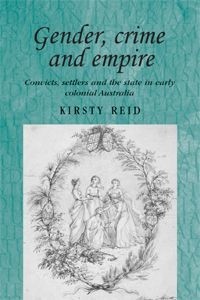 The judges are delighted to award unanimously Kirsty Reid’s outstanding book, Gender, Crime and Empire: Convicts, Settlers and the State in Early Colonial Australia, the biennial Kay Daniels Award. We also wish to give a high commendation to Michael McDonnell’s fine work in American colonial history, The Politics of War: Race, Class and Culture in Revolutionary Virginia.
The judges are delighted to award unanimously Kirsty Reid’s outstanding book, Gender, Crime and Empire: Convicts, Settlers and the State in Early Colonial Australia, the biennial Kay Daniels Award. We also wish to give a high commendation to Michael McDonnell’s fine work in American colonial history, The Politics of War: Race, Class and Culture in Revolutionary Virginia.
Reid’s work is a sophisticated and well-tempered study of early Van Diemen’s Land that examines relationships of power and ideology and their sub-spheres of class, status and gender. It is strongly grounded in the archival record, turning up information and quotations that will be a revelation and a delight even to those of us who think we know our convict period history. Reid writes with the simple and direct authority that can only come of an intimate and comprehensive knowledge of a vast range of sources in Britain and Australia. Her bibliography and notes are of a depth and quality that would send even A.G.L. Shaw into quiet raptures. Here, then, is a remarkable feat of good old-fashioned scholarship that represents a major achievement in its own right.
Reid’s focus is not on the grand narrative, however, but on the abstract issues signalled by the book’s short title, Gender, Crime and Empire. Organised thematically, it takes us from 1803 until self-government in 1853, focussing on authority in Van Diemen’s Land, its relations with higher authority in Sydney and London, and its diffusion in local colonial society. The well-organised and compelling analytical argument ranges backwards and forwards in time, assuming a good deal of narrative knowledge on the part of the reader. It is written in a lucid and jargon-free style that is not only highly accessible but a delight to read. Given the complexity of the subject and the book’s uncompromising emphasis on abstract concepts and categories, this, too, is no mean feat.
In her single-minded focus on relationships of power, class, status and gender, Reid has no time to sketch in the physical environment in which her drama is set. There is no real sense of the expansion of settlement that was taking place in Van Diemen’s Land by 1820 and the everyday realities of the colonial economy beyond the struggling early years. Aborigines are listed only once in the index, not because Reid thinks they were unimportant in themselves but because they scarcely impinged on the urban-based colonial consciousness until perhaps the late 1820s, and even then only briefly. The people of Hobart and other town-dwellers, the principal actors in this drama, had been more interested until Arthur’s time in talking about the price of bread and the Governor’s latest sexual liaison than debating the finer points of terra nullius.
Reid’s aim, in the best Rankeian tradition, is to present white colonial society in Van Diemen’s Land as it saw itself and not as we might like to see it from today’s politicised viewpoint. Unlike Ranke, however, she is not wholly taken up with the doings of the greater and lesser power-holders. In her account of the exercise of power in all its forms she also brings into sharp focus those upon whom power was more or less effectively imposed and how they responded. In the process, we learn almost as much about ex-convict James Belbin as we do about his cruel oppressor, Colonel David Collins.There is an even-handedness in Reid’s approach that comes both from well-grounded empiricism and resolute avoidance of blinkered and dogmatic theory. In passing, she deals some heavy blows to some of the historiographical fashions and clichés of the last thirty years. No-one who reads this book could continue to stomach the successive stereotypes of male and female convicts that have been presented to us. What is quite extraordinary, and we have to say heart-warming, is Reid’s depiction of many ordinary men and women devoted to each other and their children and prepared to go to quite extraordinary lengths to achieve family unity and something like a normal life. What is absolutely chilling, on the other hand, is the way in which authority, first with Governor Sorell and then with the more systematic and cold-blooded Governor Arthur, strove to deny them that normal life in order to make the convict experience a true punishment and transportation an effective deterrent to crime.
Another historiographical fashion to bite the dust is John Hirst’s seductive notion that ‘economic rationality’ or enlightened self-interest on the part of employers of convict labour civilised the convict system to the point where they ultimately, to use Donald Horne’s breathtaking hyperbole, ‘negotiated civil society’. Whatever might be said about New South Wales, in Van Diemen’s Land employers seem to have clung tenaciously to every possible means of coercing their convict workers.
The book’s pièce de résistance, the final chapter appropriately entitled ‘Sodomy and Self Government’, is a skilfully contrived analytical excursion through the febrile and self-serving anti-convict rhetoric of the anti-transportation movement which won over a gullible Colonial Office but denied the indispensable convict contribution to newly-minted Tasmania’s economic prosperity. Rejecting their characterisation by the Molesworth Committee as slave-masters in order as a means of bringing the assignment system to an end, the free settlers now heaped obloquy on the convicts from whose labour they could no longer benefit. If there is an overall narrative, it is the depressing story of how the official ideology of the family began in the early convict period with the enlightened ideal of its ensuring individual convict reformation and social good and ended with the self-serving, settler-promoted belief that it was the most effective means of holding the free immigrant labourer to his appointed task.
Here is a book, then, that would have thrilled Kay Daniels and can be properly associated with the historical agenda she worked so hard to develop. Kirsty Reid deserves our warmest congratulations for her fine achievement as an historian.
Judges: Bob Reece, Lucy Frost, Julia Clark
2006 Kay Daniels Award
Trudy Mae Cowley, A Drift of ‘Derwent Ducks’: Lives of the 200 Female Irish Convicts Transported on the Australasia from Dublin to Hobart in 1849 (Research Tasmania, Hobart, 2005)
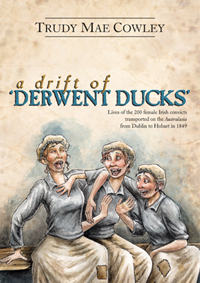 This is an impressive piece of scholarship, based on a wealth of original research, determination to dredge up and present every available piece of information about the 200 Irish women at the centre of the study, and a desire to recreate their humanity, their life experiences and their world.
This is an impressive piece of scholarship, based on a wealth of original research, determination to dredge up and present every available piece of information about the 200 Irish women at the centre of the study, and a desire to recreate their humanity, their life experiences and their world.
It provides a valuable reference point and resource for any future research in all relevant areas. The quoted material with which the book abounds comes from all sorts of sources – police and court records, depositions, diaries, wills, institutional records, newspapers, gravestones, and so on – and provides insights not only into the language, attitudes and personal experiences of many of the women and their associates, but into the institutions, systems of authority and natural environment of their native Ireland and Van Diemen’s Land. The book also includes a CD containing files of all known biographical details of the Australasia women.
Judges: Ken McNab, Julia Clark, Hamish Maxwell-Stuart
2004 Inaugural Kay Daniels Award
Lucy Frost and Hamish Maxwell-Stewart (eds), Chain Letters: Narrating Convict Lives (Carlton South, Vic: Melbourne University Press, 2001.
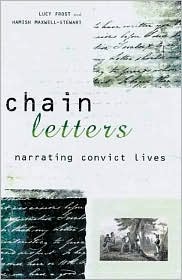 Convict history has never been more popular and never in more danger of sinking in the morass or records that governed the convict system or locked up in the institutions that appeared to make it work. Chain Letters breaks out of this mould.
Convict history has never been more popular and never in more danger of sinking in the morass or records that governed the convict system or locked up in the institutions that appeared to make it work. Chain Letters breaks out of this mould.
It uses previously unused sources to create the narratives of about 20 convicts across the entire period of transportation, to open up new ways of understanding the convict experience. It tries in a more systematic way than anything else recently published, to get inside the convict’s head and see the convict system through their eyes. For the first time we get a glimpse of what the convict system was really like for individual convicts—men, women and children—and how they experienced it.
The editors of Chain Letters, Lucy Frost and Hamish Maxwell-Stewart, are to be congratulated for developing this daring new approach, for organizing the contributors to undertake their painstaking research and for producing an exciting and original text that changes the face of convict history. They have not only rescued it from its institutional framework, they have humanized the inmates and opened up new ways of understanding its impact on Australian history. Kay Daniels would have been delighted.
Judges: Lyndall Ryan, Michael Roe, Julia Clark
